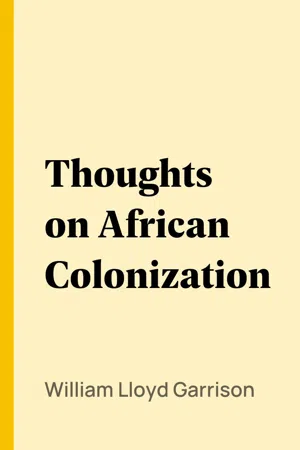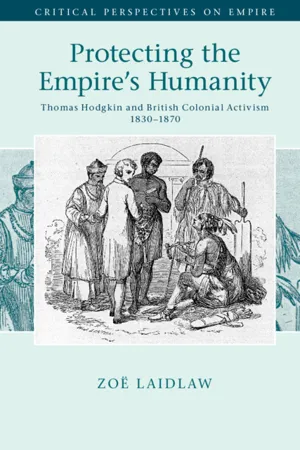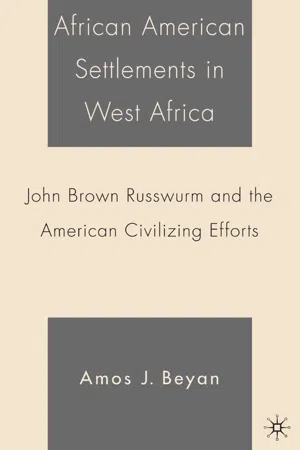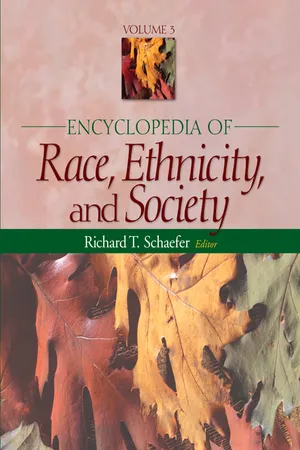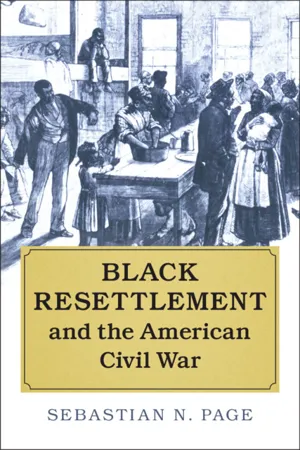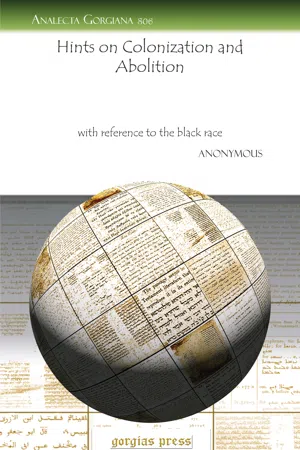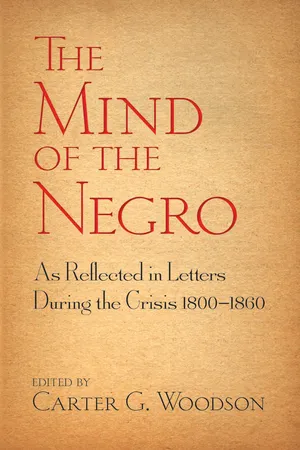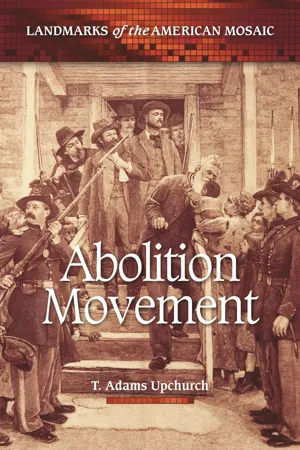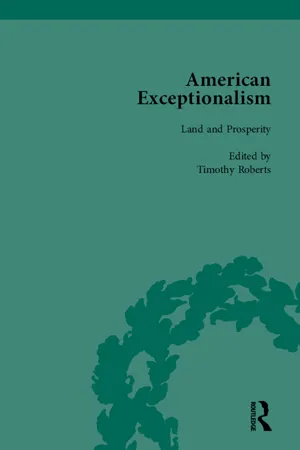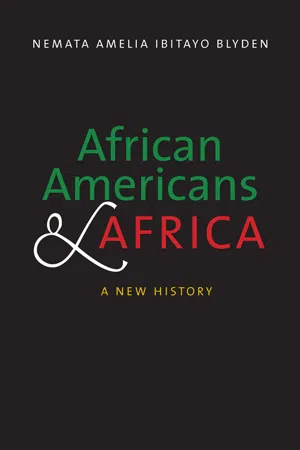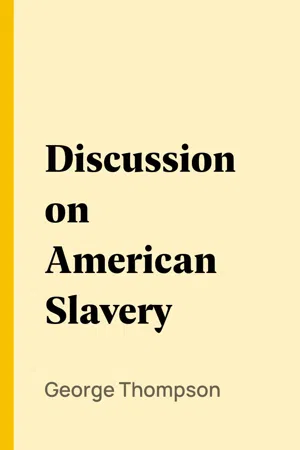History
American Colonisation Society
The American Colonization Society was a group founded in 1816 with the goal of resettling free African Americans in Africa. It aimed to address the issue of slavery by providing a means for free African Americans to return to their ancestral homeland. The society established the colony of Liberia, which eventually gained independence and became a sovereign nation.
Written by Perlego with AI-assistance
Related key terms
1 of 5
11 Key excerpts on "American Colonisation Society"
- eBook - ePub
- William Lloyd Garrison(Author)
- 2010(Publication Date)
- Perlego(Publisher)
are subjects foreign to the powers of this Society.'—[Address of the Board of Managers of the American Colonization Society to its Auxiliary Societies.—African Repository, vol. vii. pp. 290, 291.]Passage contains an image
'The American Colonization Society was formed with special reference to the free blacks of our country. With the delicate subject of slavery it presumes not to interfere. And yet doubtless from the first it has cherished the hope of being in some way or other a medium of relief to the entire colored population of the land. Such a hope is certainly both innocent and benevolent. And so long as the Society adheres to the object announced in its constitution, as it hitherto has done, the master can surely find no reasonable cause of anxiety. And it is a gratifying circumstance that the Society has from the first obtained its most decided and efficient support from the slaveholding States.'—[Sermon, delivered at Springfield, Mass., July 4th, 1829, before the Auxiliary Colonization Society of Hampden County, by Rev. B. Dickinson.]'The American Colonization Society in no way directly meddles with slavery. It disclaims all such interference.'—[Correspondent of the Southern Religious Telegraph.]'This system is sanctioned by the laws of independent and sovereign states. Congress cannot constitutionally pass laws which shall tend directly to abolish it. If it ever be abolished by legislative enactments, it must be done by the respective legislatures of the States in which it exists. It never designed to interfere with what the laws consider as the rights of masters—it has made no appeals to them to release their slaves for colonization, nor to their slaves to abandon their masters. With this delicate subject, the Society has avowedly nothing to do. Its ostensible object is necessarily the removal of our free colored population.'—[Middletown (Connecticut) Gazette.]'With slaves, however, the American Colonization Society has no concern - eBook - PDF
Protecting the Empire's Humanity
Thomas Hodgkin and British Colonial Activism 1830–1870
- Zoë Laidlaw(Author)
- 2021(Publication Date)
- Cambridge University Press(Publisher)
Some abolitionists thought that substituting ‘legitimate commerce’ in West Africa for the trade in humans would eliminate the slave trade at its source, encouraging African civilization and profitable commerce in which Britons could engage. Others questioned the imperial overtones of such schemes and urged instead a focus on emancipating slaves in the Americas. Transatlantic relationships between British and American anti-slavery activists increased in number and strength over these decades but were sometimes based on ignorance and misunderstanding. Before the late 1820s, discussions of emancipation in the United States were usually linked to black migration: ‘most white Americans believed that blacks and whites could not live together in harmony if both were free’. 4 From 1816, the American Colonization Society advocated emancipation and deracination: it provided assisted passages to Liberia to free and manumitted African Americans. 5 Beverley C. Tomek argues that while some of those within the American Colonization Society were both proslavery and racist, the movement included a significant minority of ‘humanitarian colonizers’, whose main motivation was the ending of slavery. Tomek emphasizes that US ‘anti-slavery’ could be both self-interested and benevolent. 6 In the 1830s, those who advocated immediate rather than gradual emancipation became dominant, in 1833 founding the American Anti-Slavery Society: its adherents, most prom- inently William Lloyd Garrison, reserved for themselves the label ‘abolition- ists’, and castigated ‘colonization’ on the basis that it ‘safeguarded slavery and 4 Stanley Harold and Randall M. Miller, ‘Foreword’ in Burin, Slavery and the Peculiar Solution, p. xiii. 5 For an overview of American Colonization Society (ACS) history: Burin, Slavery and the Peculiar Solution, esp. pp. 6–33; Yarema, The American Colonization Society. 6 Tomek, Colonization and Its Discontents, pp. 4, and 1–17 passim. - eBook - PDF
African American Settlements in West Africa
John Brown Russwurm and the American Civilizing Efforts
- A. Beyan(Author)
- 2005(Publication Date)
- Palgrave Macmillan(Publisher)
As noticed, the oppression of blacks was reinforced following the framing of the national constitution in 1787. This was African American Settlements in West Africa 40 Figure 3.1 Certificate for life membership of the American Colonization Society.The Certificate cost $30.00 per copy. It shows the signature of William McClain and Henry Clay, two prominent members of the Colonization Society. (Courtesy of the Library of Congress.) illustrated by the nationalization and recognition of slavery in 1793 and 1808 respectively by the new constitution. 4 The reinforcement of slavery and other forms of black oppression, however, radically contradicted the democratic values that American lead- ers were trying to promote in the new country.It could, therefore, be main- tained that the ACS, founded in 1816 and reorganized in Washington, DC in 1817, was partly an attempt at reckoning with the above contradictions by America’s new generation of politicians, clergyman, and intellectuals. 5 Finley,a New Jersey Presbyterian clergyman, in proposing a colonization of blacks in Africa in his book, titled, Thoughts on Colonization, empha- sized the “positive good pro-slavery” argument that was as old as the one that had been used to justify the transatlantic slave trade. 6 He maintained, for example, that since the free blacks were to a degree civilized, they would serve as prime agents for promoting civilization in “dark” Africa. The colonization of American blacks in Africa would then accomplish “a happy and progressive” end, and further, would get rid of slavery in America. 7 Clay, one of the leading sponsors of the ACS declared that although they were addicted to vices and had the potential of corrupting the slaves and poor whites, the free blacks, if they went to Africa, would promote “the holy cause of civilization, religion, and free institutions” in that continent. - eBook - PDF
- Richard T. Schaefer(Author)
- 2008(Publication Date)
- SAGE Publications, Inc(Publisher)
Such voyages encouraged many free Black and White abolitionists to do the same. Drawing on the success of the Fourah Bay settle- ment and Cuffe’s inspirational voyage, the American Colonization Society (ACS) (formally named “The American Society for Colonizing the Free People of Color of the United States”) was established in 1816. Its aim was to have liberated Blacks colonize the western coast of Africa. Three groups supported the ACS. First, there were those who believed that reset- tlement was the only means by which Blacks could obtain a modicum of freedom and justice. Others were motivated by the goal of spreading Christianity to what they saw as “savage” Africa. The third group— and the source of most ACS support—were southern planters and slaveowners who grew fearful of the free Black population. Slaveowners wanted free Blacks removed from the nation for fear that they might ignite an insurrection among slaves. Therefore, many slaveowners saw repatriation as the only means of rid- ding themselves of this “dangerous” group, especially given the success of the Haitian revolution. Sailing for Sierra Leone In 1820, the ACS launched the brig Elizabeth, bound for the Grain Coast with eighty-eight African American emigrants. The Elizabeth landed at Sherbro Island in Sierra Leone. Soon thereafter, about a quar- ter of the would-be colonists died of vector-born dis- eases like malaria, dengue, and yellow fever. Led by Elijah Johnson, the survivors retreated to Freetown, 125 B Sierra Leone. Despite the initial failure, the ACS pushed forth and sailed a second group in 1821. Escorted by the U.S.S. Alligator, the Augusta landed in 1821 at Cape Mesurado, a site that was selected by a young American lieutenant named Matthew Perry. After negotiations with indigenous African chiefs— who reluctantly agreed to sell their land—the ACS agents and settlers purchased sixty miles of land along the coast for U.S. - Sebastian N. Page(Author)
- 2021(Publication Date)
- Cambridge University Press(Publisher)
Introduction From the Revolution to the Civil War, white Americans entertained the strangest of notions: their black compatriots, who comprised one-fifth of the population in 1770 and still one-seventh by 1860, could, would, and should leave the United States for some other land. Stranger yet, the same blacks whom whites thought too degraded to ever form part of the American nation would civilize other peoples, thanks, ironically, to the American influences that they had imbued. 1 That belief was called “col- onization,” at once an ideology, a movement, and, most famously, the eponymous project of the American Colonization Society (ACS), estab- lished in 1816–17. 2 In the 1820s, the northern reformers and southern slaveholders who had founded the ACS secured a settlement in west Africa for black Americans, which they named Liberia. Although these “colonizationists” – that is to say, the supporters of colonization, as distinct from the colonists themselves – would be the best-known face of the movement, the ACS (and Liberia) was far from the only scheme (and location) that Americans had in mind. Indeed, the major contribu- tion of this book is to chronicle the full geographic and institutional range of the drive for black resettlement. In the labor-hungry Americas of the nineteenth century, it was remark- able that a movement to expel part of the workforce even existed, 1 Hugh Davis, “Northern Colonizationists and Free Blacks, 1823–1837: A Case Study of Leonard Bacon,” Journal of the Early Republic 17 (1997), 662; Samuel E. Cornish and Theodore S. Wright, The Colonization Scheme Considered (Newark, 1840), 15–16. 2 Eric Foner, “Abraham Lincoln, Colonization, and the Rights of Black Americans,” in Richard J. Follett et al., eds., Slavery’s Ghost: The Problem of Freedom in the Age of Emancipation (Baltimore, 2011), 34. 1 let alone inspired humanitarians, politicians, and the public.- eBook - PDF
Hints on Colonization and Abolition
With reference to the black race
- Anonymous Anonymous(Author)
- 2010(Publication Date)
- Gorgias Press(Publisher)
Let the colonizationists no longer make excuses for slavery, which too many have done; but acknowl-edging the evils of that wretched system, and taking for granted, as from the beginning, that it was so bad, men only needed to [23] see their way clear to break it up, let us lay open before the pub-lic in the practical operations of our cause, the great and effec-tual door which God has set for the deliverance of this country, for the regeneration of Africa, and for the redemption of the black race. The second of those great objects is, with ordinary faithfulness and prudence in conducting the affairs of the Society and the colony, already rendered nearly certain. Freedom and religion and civilized life have been transplanted in the persons of her own sons, into that desolate continent, and we commit to God the issue on which His own glory is so deeply staked. What the Colonization Society is now doing, would, at the end of a single century, if continued at the same rate, exhibit more than a million of persons in Liberia, as the fruits of its operations. I speak of course of the natural increase of the people sent there as well as the emigrants themselves, basing the calculation upon the rate of increase among ourselves. Let us take heart then, and go forward in the work, and the ends of the earth will call us blessed. As for America, we are doing nothing; and for the black race here, alas! how little. The operations of the Society have not removed from the country perhaps one in many hundreds of the annual increase of the black population since its operations com-menced. That the annual increase from 1830 to 1S40, will not vary much from eighty thousand a year. A t its rate of removal since the first of those periods, the Society has not removed yearly one out of every hundred of the increase. - Carter G. Woodson(Author)
- 2013(Publication Date)
- Dover Publications(Publisher)
LETTERS TO THE AMERICAN COLONIZATION SOCIETY 1The following letters are not all of the correspondence which the American Colonization Society had with Negroes presenting themselves as prospective emigrants to Liberia. Letters of various sorts typical of a large number of like import have been selected. Although these letters show the methods of colonization, the effect of the movement on the Negro, the hopes that it stimulated, and those that it blasted, the purpose of selecting these documents is not primarily to facilitate the study of colonization but to illuminate the study of the free Negro in the United States. Most of these persons who corresponded with the American Colonization Society were free or became free thereafter on the condition that they should emigrate to Liberia. The value here lies in what is said about the social and economic conditions of the free Negro, about whom such a little is known. These communications, then, constitute a valuable source for determining what this group was thinking, feeling, attempting, and accomplishing at that time.The Negroes herein represented were largely in the South, where as slaves they had only such opportunities as they could snatch from begrudging masters, or when free only such as a hostile environment occasionally permitted them to enjoy. The Southern Negroes were easily influenced by the American Colonization Society and more easily reached because of the interest of certain whites of that section in the deportation of the free Negroes there and of such others as might be liberated by conscience-stricken slaveholders. Wherever the Negroes had enjoyed freedom in the North, they did not easily embrace the idea of expatriating themselves. The Northern Negroes usually took the position that here their fathers fought, bled, and died for the country, here they were born, and here they intended to die. Occasionally, however, the American Colonization Society received letters from prominent Negroes of the North expressing interest in colonization and seeking opportunities to go to Liberia. This was especially true during the fifties when the heel of oppression upon the Negro in the North was becoming heavier and heavier. In writing about the particular thing they had in mind these seekers mentioned other important facts as to what was going on in most parts of the country.- eBook - PDF
- T. Adams Upchurch(Author)
- 2011(Publication Date)
- Greenwood(Publisher)
No sooner had the War of 1812 ended and freedom of the seas been restored than a free black Quaker shipbuilder from Massachusetts named Paul Cuffe (or “Cuffee”) started transporting fellow free blacks to Africa. Within The Emergence of a National Movement 23 two years, a group of white political and religious leaders that included President James Monroe, former President James Madison, Speaker of the House Henry Clay, and Chief Justice John Marshall, among many other famous southerners, formed the American Colonization Society (ACS) in Washington, D.C. Elected the first president of the ACS was George Washington’ s nephew, Bushrod Washington, who was a justice of the U.S. Supreme Court and, like most of the other ACS members, a slave holder. Collaborating with the U.S. government, the British government, and African tribal chieftains, the ACS established the nation of Liberia on the west coast of Africa to be the designated place for colonizing free blacks from the United States. In 1820, it settled its first group of colonists there. By 1830, it had settled more than 1400, and within another two years, some 32 American states had endorsed the ACS and its Liberia mission. From the beginning, however, the ACS was plagued by problems. First, it relied on white slave holders to manumit their slaves voluntarily, which would prove a difficult proposition throughout the organization’s history. Few took the ACS up on its offer. This should not be surprising considering that some ACS leaders did not lead by example in this regard. Bushrod Washington, for instance, who had inherited George Washington’s substantial Mt. Vernon estate, kept his slaves until his death in 1829, never freeing them, not even in his will. A second, related problem was that the ACS mainly relied on philanthropy rather than tax money to accomplish its mission, and there was never enough money to fill the need. - eBook - ePub
- Timothy Roberts(Author)
- 2017(Publication Date)
- Routledge(Publisher)
THE AMERICAN COLONIZATION SOCIETYRobert Finley, Thoughts on the Colonization of Free Blacks (Washington, DC, 1816).Ralph Randolph Gurley, A Discourse, Delivered on the Fourth of July, 1825, in the City of Washington (Washington, DC: Printed by Gales & Seaton, 1825).Leonard Bacon, Discourse at the Funeral of Jehudi Ashmun Esq. A Discourse Preached in the Center Church, in New Haven, August 27, 1828, at the Funeral of Jehudi Ashmun,1 Esq. Colonial Agent of the American Colony of Liberia … With the Address at the Grave by R. R. Gurley (New Haven, CT: Printed by Hezekiah Howe, 1828).The following three texts all express the zeal and rationale of the American Colonization Society (ACS). The ACS’s principal founder was Robert Finley (1772–1817), a graduate of the College of New Jersey (later Princeton University) and instructor of classical education at Princeton until 1817 when he accepted the presidency of the University of Georgia. In 1795 Finley was ordained as pastor of the Presbyterian Church at Basking Ridge, New Jersey, where he originated the concept of the modern Sunday School curriculum. Finley sought for grand social reform, however. He had visited Charleston South Carolina after college and witnessed slavery at first-hand, and was distressed by the deprivations of free blacks he encountered in the North.In 1816 Finley travelled to Washington to lobby the US president and Congress for support for an African colonization scheme; the ACS was founded on 21 December 1816. Finley died shortly thereafter, but under the new secretary Ralph Randolph Gurley (1797–1872), a Yale College graduate and Presbyterian minister, colonization became a movement that swept New England’s churches and college campuses. As ACS secretary, Gurley edited the African Repository and Colonial Journal - eBook - PDF
African Americans and Africa
A New History
- Nemata Amelia Ibitayo Blyden(Author)
- 2019(Publication Date)
- Yale University Press(Publisher)
Pro-colonizationists argued that American blacks were necessary to uplift and civilize Africa. Even those leaders who rejected Africa as a site of immigration recognized their connection to the conti-nent. In 1896 a conference brought together leading black and white scholars, journalists, and activists in Atlanta, Georgia. Participants spoke on diverse topics pertaining to Africa: the missionary move-ment, religious beliefs in Africa, the plight of African-descended Africa is their country. They should claim it. 125 people in Africa and the diaspora, the American Colonization Soci-ety, health and hygiene, and slavery in Africa. Although some of the participants criticized colonialism, many accepted Europe’s pres-ence in Africa as largely positive. T. Thomas Fortune, a leading jour-nalist, activist, and adviser to Booker T. Washington, praised the technological advancements Europeans introduced into Africa, pointing to the religious benefits Africans gained. He believed that blacks were “here [the United States] and must make the very best of the situation as we find it,” which did not prevent his agitating for better rights for Africans. Fortune looked for a united Africa and during his life was involved with many organizations connected with the continent. This did not preclude him from agitating for change in America. Founder of the National Afro American League in 1890 , Fortune called for equality in America—the restoration of black voting rights, redress for violence against blacks, equal funding of black schools, equality in the justice system, and an end to discrimi-nation in public accommodation and transportation. 22 Other speak-ers at the Georgia gathering stressed the role African Americans could play in Africa. Henry McNeal Turner, true to his principles, delivered a speech entitled “The American Negro and the Father-land,” reiterating his calls for emigration. - eBook - ePub
- George Thompson(Author)
- 2010(Publication Date)
- Perlego(Publisher)
"The most high God hath made of one blood all the families of man to dwell on the face of all the earth, and hath endowed all alike with the same inalienable rights, of which are life, liberty, and the pursuit of happiness; yet there are now in this land, more than two millions of human beings, possessed of the same deathless spirits, and heirs to the same immortal hopes and destinies with ourselves, who are nevertheless deprived of these sacred rights, and kept in the most cruel and abject bondage; a bondage under which human beings are bred and fattened for the market, and then bought, sold, mortgaged, leased, bartered, fettered, tasked, scourged, beaten, killed, hunted even like the veriest brutes,—nay, made often the unwilling victims of ungodly lust; while, at the same time, their minds are, by law and custom, generally shut out from all access to letters, and in various other ways all their upward tendencies are repressed and crushed, so as to make their "moral and religious condition such that they may justly be considered the heathen of this country;" and since we regard such oppression as one of the greatest wrongs that man can commit against his fellow; and existing as it does, and tolerated as it is, under this free and Christian government, sapping its foundation, bringing its institutions into contempt among other nations, thus retarding the march of freedom and religion, and strengthening the hands of despotism and irreligion throughout the world; and since we deem it a duty to ourselves, to our government, to the world, to the oppressed, and to God, to do all we can to end this oppression, and to secure an immediate and entire emancipation of the oppressed; and believe we can act most efficiently in the case, in the way of combined and organized action:—Therefore, we, the undersigned, do form ourselves into a Society for the purpose."If there was anything for which the abolitionists as a body were peculiarly distinguished, it was for the perfect uniformity of sentiment upon all great points connected with the general question of slavery. This was attributable to the clearness and fullness with which the principles of the Society had been enunciated. Not so with the Colonization Society. You quoted the language of the most eminent of its supporters, but were immediately told that the Society was not answerable for the views or designs of its advocates. How very different a course did the Colonizationists pursue towards the Anti-Slavery Society. That Society was not only made answerable for all which the abolitionists really said, and really
Index pages curate the most relevant extracts from our library of academic textbooks. They’ve been created using an in-house natural language model (NLM), each adding context and meaning to key research topics.
